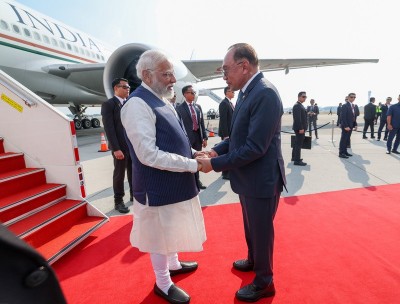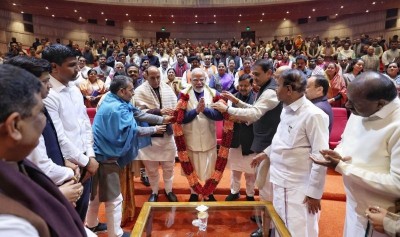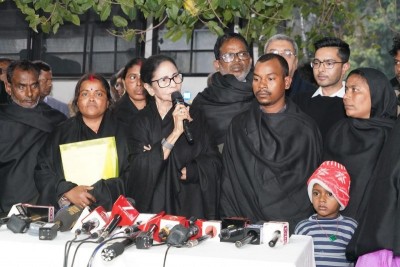 Islam
Islam
Islam is culture-agnostic, embraces diversity as will of God
Islam is culture-agnostic. There is no one monolithic culture within Islam that Muslims should be practicing. Diversity is the will of Allah as He has created diverse people and diverse cultures. So, Muslims follow as many cultures as many lands they inhabit and as many people they live with. They are Arabs, Persians, Turks, Asians, Americans, Africans, Europeans, Russians and Indians.
The Quran, the fountainhead of Islamic guidance, explains clearly how Muslims may come from many different cultures, mentioning that Allah created all people from a single “man and woman,” Adam and Eve, and then “made [humankind] into peoples and tribes” [49:13]. Diversity is something that Allah created for us to live with to enrich our lives.
Another example of Islam’s harmony with different cultures is the lifetime of Prophet Muhammad. Before he declared himself the apostle of Allah, he was in employment of his wife Khadijah for taking his trade caravans to distant places. He would meet all types of people, ranging from different strata and professions, yet he never found anyone or their cultures abhorrent.
Only for those acts from which Islam prohibits, he exercised abstinence. In fact, he would carry tales of Christians and Jews and share them with his own people. He did not only have business alliance with them, he had a sound camaraderie with them. Whenever they visited Mecca, they would freely follow their own culture.
The Prophet taught his people to be open to alien cultures as an effective enrichment of their own depended on imbibing “good and useful things” from them. As a matter of fact, there were times when the wealth of cultural diversity was an asset to the Prophet. The most famous example is of his Persian companion named Salman al-Farsi.
There was an upcoming battle that the Muslims had to prepare for and Salman suggested a specific battle strategy used in his homeland which consisted of digging a ditch around the city. His Persian culture and heritage played such a huge role in this military campaign that it is referred to as the “Battle of the Ditch” or Ghazwa-e-Khandaq.
The earliest forms of Muslim culture were based on the cultural practices of the Arabs, Byzantines, and Persians. As the Islamic empires expanded, Muslim culture was also influenced by other cultures, including the Iranian, Caucasian, Turkic, Indian, Malay, Somali, Berber, and Indonesian cultures.
With the conquests of Muslims and their settlements with people of far off lands created a literature, music, art, languages, cuisines, clothing, sports, warfare, statecraft, jurisprudence and religious practices that wore imprints Islamic teachings. They however were not abusive or distasteful of local cultures and customs. They were in fact a blend of local and exotic. And thus we saw great cultures that were known as Persian, Turkish and Indic. They have thrived in their pristine forms to this day.
But as time passed and the world arrived in its modern age and Muslims lost their empires, their cultural identity also came under question. They began to be defined by their beards, skull caps, dietary habits, daily religious practices and even their distinct dressing. Though barring religious practices, all other indicators like beards, clothes, diets, etc, are common with followers of all other religions, with only a modicum of difference.
 Islam is culture-agnostic. Photo courtesy: Unsplash
Islam is culture-agnostic. Photo courtesy: Unsplash
Indic Islam
The instance of India mixing of Islam with local culture is the most profound. In India, it was as if the soul of Islam found a welcoming abode. Even though it were traders and warriors who took the first whip of Islam to Indic shores, its most ardent followers – the mystics or sufis – made Islam accessible to folks.
Their malleable and therapeutic ways of mingling with locals made Islam one of India’s own creeds. Soon, Islam was present in the form of mosques, singing dervishes, revered shrines, qawwalis, poems and hearts of those who seek divinity in every part of their motherland.
In India, the multicultural social setup has been strengthened through improvisations, adjustments, mutual respect, and the conceptualisation of a transcendental life that goes beyond religious and cultural stereotypes. This has been possible through the influence of syncretic traditions such as Sufism, Bhakti, and other mystical practices. These traditions have played a significant role in fostering unity, peaceful coexistence, and becoming an integral part of the socio-religious life of the people.
Mysticism, which involves seeking hidden meaning and a connection with God through deep prayer or contemplation, is particularly embraced by Sufis and Bhaktas in India.
These movements emerged as inclusive reactions to exclusive interpretations and practices within Hinduism and Islam, allowing common people to express their inner sentiments and actively participate in the process of loving the Divine.
India has a long history of syncretism, even before the arrival of Islam and Christianity. The diverse nature of Hinduism, with its various sects and deities, required the tradition of syncretism to prevent hostility among followers. The advent of Buddhism and Jainism further complicated the religious landscape, making syncretism essential for harmony.
The result of this religious confluence is that Muslims, Hindus, Sikhs and Christians in India can be seen donning the same dresses, eating the same kind of food and sometimes celebrating almost similar festivals. Though such unity of cultures sometimes comes under attack from hardliners and religious fanatics, it has defied any threat and continues unabated.
Even people who convert to Islam from other religions are not forcefully coaxed to abandon their indigenous cultural ways and strictly adhere to perceived Muslim ways. They are only asked to shun some “prohibited” practices.
Islam versus West
There are five fundamental pillars of Islam -- pray daily, pay alms, fast through Ramadan, pilgrimage to Mecca, and declare Muhammad as a messenger of the one true God. However, if one is living in the West, abstaining from pork could be one more.
Actually, a manual of a Muslim in the West could be like this: what he doesn’t do -- eat pork, celebrate Christmas, drink alcohol, gamble, and date. How do Muslims respond to such categorisation? Well, neither of the mentioned practices calls for strict following if one is not a Muslim.
A Muslim who goes to a mosque, keeps fasts and abstains from everything that Islam forbids is as much an American and European as a Christian or Jew is. Similarly, neither do Muslims in Muslim-dominated countries expect and force non-Muslims to shun their culture and conform to Islamic ways of living.
Islam is as much West as it is East, North or South. It is global in its texture and totally culture-synergetic
Support Our Journalism
We cannot do without you.. your contribution supports unbiased journalism
IBNS is not driven by any ism- not wokeism, not racism, not skewed secularism, not hyper right-wing or left liberal ideals, nor by any hardline religious beliefs or hyper nationalism. We want to serve you good old objective news, as they are. We do not judge or preach. We let people decide for themselves. We only try to present factual and well-sourced news.







